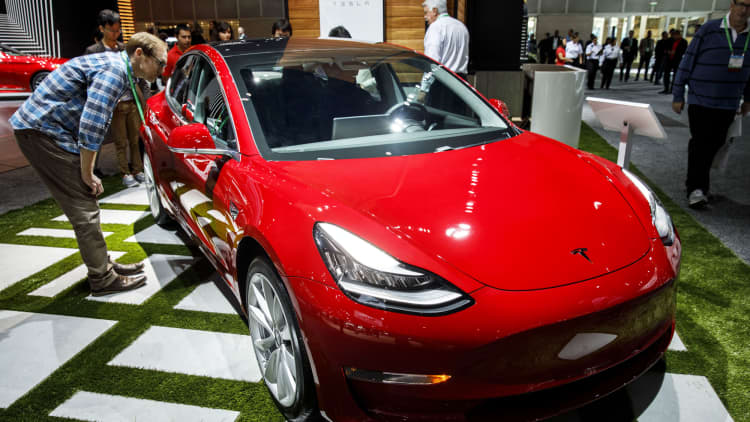
Tesla's battery production for the Model 3 is the company's real obstacle to putting cars on the road, not Model 3 assembly itself, said Oppenheimer analyst Colin Rusch on CNBC's "Power Lunch."
"The real concern for us ultimately is how many batteries they can make that fit the specs," he said, adding that he thinks Tesla is having quality issues with the 2170 battery cells. The 2170 is a new cell found only in the Model 3.
"We think they have a quality issue with the move to the 2170s and the chemistry changes, and we think that is the real bottleneck here," Rusch said.
Tesla said claims of quality issues with its 2170 cells are false.
Tesla has had numerous issues as it has ramped up production of the Model 3, and has repeatedly missed its own production targets. CNBC has previously reported on issues with battery production at the Gigafactory, near Reno, Nevada.
On Tuesday, an email to employees from CEO Elon Musk was leaked to the press saying Tesla is going to try to be able to increase production capacity to the point where the factory can churn out up to 6,000 cars at any given point by the end of June. From there, the company is going to work toward achieving a steady production rate of 6,000 cars per week.
But given its history, Tesla will need to find a production partner on the assembly line to hit those kinds of numbers, Kelley Blue Book managing editor Matt DeLorenzo told CNBC.
"They need to partner because they have been doing this stop-start thing," he said. "Now the batteries may have an effect on that, but if they are going to hit a 6,000 run rate they are going to need a lot more people and better management to get that kind of throughput," he said.
DeLorenzo referred to a Bloomberg report of an email from executives asking for volunteers from among Tesla employees to work on the Model 3 production line in order to meet the company's quarterly production goal of 2,500 cars per week and "prove the haters wrong."
Tesla previously missed the target, producing just over 2,000 Model 3 cars a week in the first quarter.
CLARIFICATION: Tesla produced just over 2,000 Model 3 cars a week in the first quarter of 2018. That rate was not clear in an earlier version of this article.


